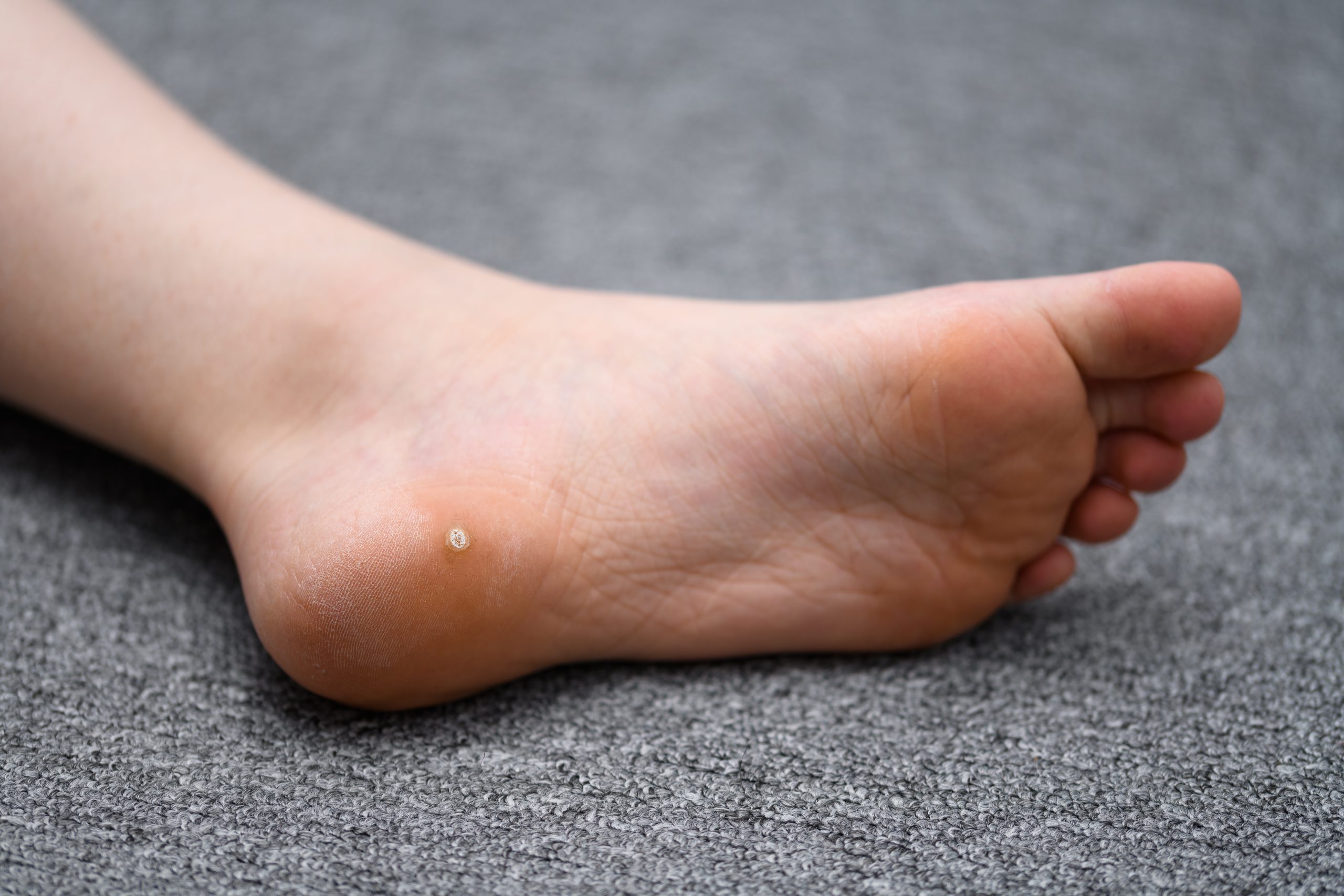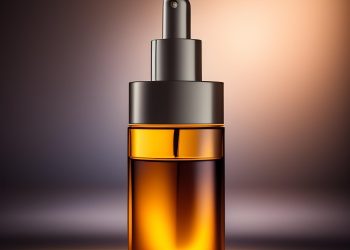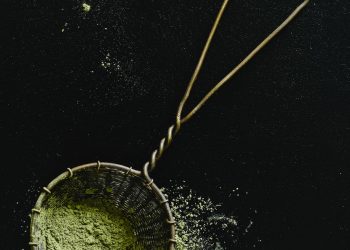Phlegm is a “liquid secreted by the mucous membranes of mammals” that contains lipids, glycoproteins, and immunoglobulins, among others [1].
It serves several purposes for the body, including keeping tissue surfaces moist to prevent them from drying and cracking [2].
It also traps bacteria and other harmful invaders before they enter the body and cause infection [2].
The color of phlegm may also hint at different conditions. For example, if your phlegm is white or grayish, it may signal a sinus or upper respiratory tract infection. Green or dark yellow may reveal bacterial or viral disease.
But, if you have bloody phlegm, it could signify something more serious such as pneumonia, pulmonary embolism, or cancer [3].
You need to consult your doctor to diagnose your condition and treatment accurately.
Besides the prescribed medications, you can rely on some home remedies to get rid of phlegm without any risk of side effects.
Home Remedies to Get Rid of Phlegm and Chest Congestion
1. Steam
One of the easiest and simplest ways to expel phlegm is to inhale the steam. It helps to dissolve the sticky substance to make it easier for you to get rid of it.
When it’s no longer sticky, expelling it through the mouth or nose is much easier.
That’s not all that it could do. Steam can also keep the respiratory tract moisturized, which is helpful as a dry environment is a breeding ground for bacteria and viruses.
Various studies have shown the efficacy of steam in expelling phlegm. In addition, and at the same time, it shows how steam relieves conditions associated with mucus, such as a cough [4, 5].

You can add some volatile oils such as eucalyptus oil or cedar leaf oil to water to improve the efficacy of steam [5].
But, it’s essential to know that it’s dangerous to use these oils excessively, as they had adverse effects on animal subjects involved in one clinical trial [5].
If you like, you can use plain water to be safe.
How to take steam to expel phlegm in the throat and chest:
Method 1:
Pour hot boiling water into a basin. Wrap your head with a towel. Move your face close to the bay and inhale the steam. Do this for 10 minutes three times a day.
Method 2:
Another way to loosen phlegm is to take a steam shower twice daily. Turn the battery to full heat. Close the bathroom and stay inside for 10 minutes. Apply lotion on your skin to prevent it from drying out.
2. Water
If you think steam is the most straightforward remedy for phlegm, wait until you hear about this one.
Water is even simpler, as you don’t have to boil it or turn it into steam to inhale it; you have to drink plenty of water during the day.
Water helps dilute the phlegm, so it’s much easier to expel.
Frequent water intake thins the mucus, so it doesn’t stick to the respiratory tract.
Researchers state that water is the “most effective means of liquifying the bronchial secretions in asthmatic children.” [6]
Even those who don’t have asthma, but are suffering from other respiratory ailments like allergies, cough, or cold, can also take advantage of this home remedy that’s a cinch to put together.
If you don’t like the bland taste of water, try adding slices of fruits. These fruits won’t only improve the flavor but also boost the nutritional content of your beverage.
The most straightforward remedy for phlegm is using water:
Drink eight to 10 glasses of water. To make it more palatable, infuse it with flavor by adding slices of cucumber, lemon, or watermelon into a water pitcher. Let it cool in the refrigerator for at least 30 minutes before drinking. Fluids help soothe an irritated throat and loosen secretions.
Read More: 7 Oxygenated Water Benefits That’ll Surprise You!
3. Honey
A cough caused by viruses or bacteria can cause increased phlegm production in the respiratory tract.
An efficient way to relieve this is with honey. Many studies confirm the efficacy of love for cough relief, particularly for children. [7, 8, 9]
Clinical investigations reveal that parents prefer honey to relieve cough in children. Because it effectively reduced symptoms and helped children sleep better at night. [7, 8, 9]
Honey can work better than commonly prescribed cough medications such as dextromethorphan and diphenhydramine. [7]
Moreover, honey also works in mild symptoms of another common respiratory ailment called allergic rhinosinusitis, which also causes overproduction of phlegm [10].
How to use honey for clearing phlegm from the chest and throat:
Method 1:
Combine ¼ tsp of black pepper and one tablespoon of honey. If black pepper is not available, you may use white pepper. Take this mixture twice a day for one to two weeks.
Method 2:
In a glass of warm water, stir in one tsp of honey and lemon juice. Drink solution three times a day for one week.
Read More: 10 Health Benefits of Honey (Backed by Science)
4. Eucalyptus Oil
The source of this essential oil is the leaves of an evergreen tree from Tasmania and Australia [11].
The plant originated in these countries. But, it wasn’t long before news of its therapeutic purposes spread to other countries such as Spain, China, India, and Portugal, among many others [11].
Over the years, more and more people have relied on eucalyptus oil as a home remedy for various respiratory ailments, including cough and the common cold.
People in the United States and Germany admire this oil for its expectorant actions, which can help expel phlegm due to viral or bacterial respiratory infection [11].
It is typically added to tablets and syrups and used in vapor baths and inhalation [11].
Learn how to use eucalyptus essential oil for phlegm:
Pour 3 drops of eucalyptus oil into hot water. Cover your head with a towel. Move closer to the basin of hot water to inhale the aroma. Do this for 10 to 15 minutes three times a day. You can also use a diffuser if you have one.
Read More: 7 Essential Oils for Chiggers Bites & Relief from the Itch
5. Lemon Oil
In Ontario, Canada, researchers looked at lemon oil’s role as an expectorant inhalant [12].
They administered lemon essential oil in the form of steam to euthanize rabbits.
The rabbits had to inhale to assist in the expelling of phlegm that was stuck in their respiratory tract [12].
The experiment increased phlegm output and, at the same time, reduced the amount of respiratory tract fluid [12].
Researchers explain that lemon oil’s expectorant properties stimulate the secretory cells in the respiratory airway. As a result, it boosted the volume and concentration of mucus [12].
They believe these effects are due to active compounds such as pinene and limonene [12].
An easy way to use lemon oil for phlegm:
Add 2 tsp of lemon juice to a glass of warm water and mix. Pour a drop of lemon oil and 1 tablespoon of honey. Stir well to blend the solution. Drink the solution three times a day for up to one week. After that, it’s better to use warm water instead of cold.
Read More: 10 Ways Lemon Oil Can Benefit your Health
6. Nutmeg Oil
Nutmeg oil is another practical remedy for excessive phlegm.
It’s not as popular as eucalyptus or steam inhalation. But some people rely on this oil to eliminate that sticky substance in the respiratory tract.
A study conducted in 1970 shows that animal subjects inhaling nutmeg oil had an increased output of respiratory tract fluid. [13]
This action may be due to the active compound in nutmeg, which is camphene. [13]
Of course, as with other essential oils, you cannot use nutmeg oil undiluted, as doing so can cause irritation and other adverse effects.
How to consume nutmeg oil to treat phlegm:
Add 2 drops of nutmeg oil and 1 tsp of honey to a glass of warm water. Stir well. Drink the solution. Sip it slowly to ensure your body can absorb the antibacterial agents sufficiently. Do this two to three times a day.
Read More: 19 Essential Oils for Cold Sores Remedy with Directions
7. Clove Oil
The dried flower buds of clove have been a folk remedy for various ailments for centuries. [14]
Among the many diseases it can treat are headaches, gum problems, scabies, wounds, and tooth infections. It is also known for its expectorant actions. [14]
Expectorants such as clove oil make it easier to “cough up phlegm.” [15]
It helps clear the passages and treat various respiratory infections, including colds, coughs, asthma, bronchitis, and sinus conditions. [15]
Try this clove oil recipe for phlegm:
Add 1 drop of clove oil to a glass of warm water. Stir well. If you’d like to improve the taste, you may add honey. Drink the mixture slowly. Follow this procedure twice a day for up to one week.
Read More: 9 Best Essential Oils for Asthma Attacks + (How to Use Them)
8. Peppermint Oil
Peppermint is a popular remedy for bad breath. It’s not only functional but also widely available in the form of breath fresh mints and candies.
Did you know that it can also work wonders in getting rid of phlegm in people suffering from respiratory ailments?
In Brazilian traditional medicine, people used it as an antispasmodic and expectorant. Besides, it reduces chest congestion. [16]
Scientists from Brazil confirm its relaxation effects on the respiratory tract. [16]
Make sure that when you use peppermint oil, you dilute it first in water or carrier oil, as it is too strong when used in its pure form.
Soothe your phlegm symptoms with this peppermint oil bath:
Turn the shower to full heat and let the steam fill the bathroom. Add 10 drops of peppermint oil to warm bath water. Soak in the tub for half an hour. Inhale deeply to take in the steam and peppermint aroma. Do this once or twice a day.
Read More: 8 Reasons to Use Peppermint Oil for Hair
9. Garlic
Historical records document the use of garlic since ancient times.
Some reports show that people used garlic when Greek temples and Egyptian pyramids were under construction. [17]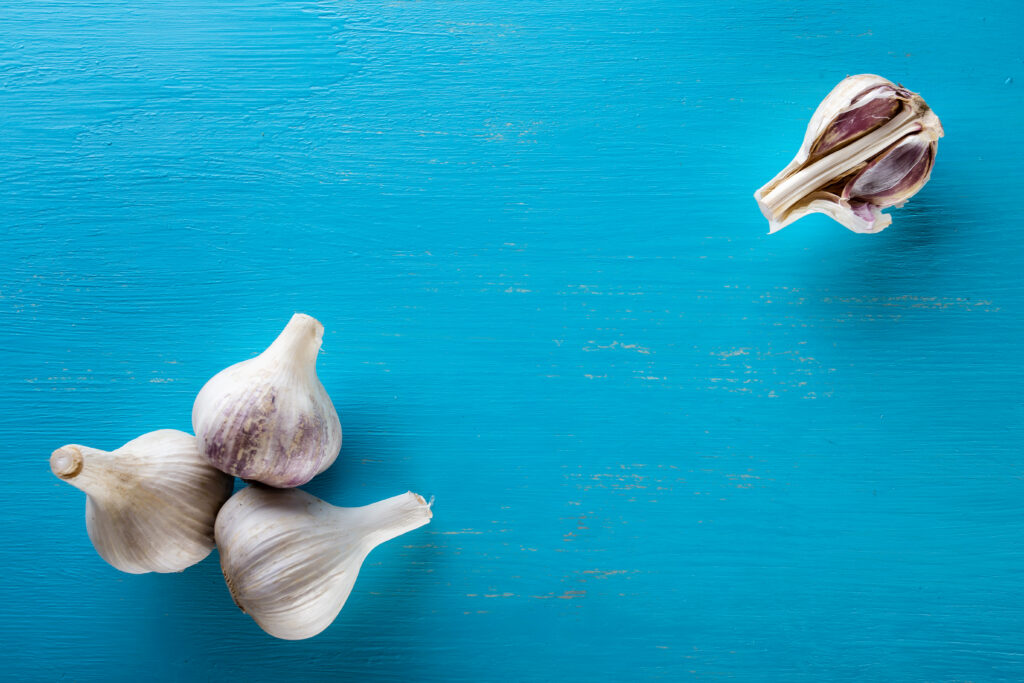
Hippocrates even prescribed it to relieve a wide variety of conditions. [17]
Today, garlic remains a powerful solution for many ailments. These include intestinal problems, tuberculosis, parasitic infections, and diarrhea. [18, 19]
If you’re having a hard time getting rid of phlegm in your throat, garlic can also help.
African herbalists have long used this plant to treat respiratory infections, including asthma. [19]
As a proven antimicrobial agent, garlic can end viral and bacterial infections, which are the common causes of excess phlegm. [20, 21]
How you may eat garlic to soothe infections:
Peel 3 cloves of garlic and crush. Chop into fine pieces. Add 2 tablespoons of sugar to the chopped garlic. Blend if you’d like the consistency to be like a paste. Otherwise, consume it after setting aside 30 minutes. Take this twice a day.
Read More: 19 Essential Oils for Cold Sores Relief: Benefits and User Guides
10. Thorny Olive
Thorny olive belongs to the Elaeagnaceae plant family. Traditional Chinese healers have used its leaves to treat bronchitis and asthma. [22]
In this study performed by Chinese researchers, they evaluated thorny-olive for its anti-asthma and expectorant actions. [22]
According to the findings, this herb reduced the severity and frequency of your cough and helped expelled phlegm. [22]
Used the right way, this plant can help reduce the problem of mucus triggered by respiratory infections.
A simple thorny olive remedy for phlegm:
Boil a glass of water in a pot. Add the leaves. Simmer for 30 minutes over low heat. Remove from heat. Strain the leaves. Drink one glass of the concoction. Repeat remedy three times a week.
Read More: Olive Oil on Face: 6 Benefits + How to Use It
11. Ginger
Ginger is highly popular for its pharmacological properties. Spice is the choice remedy for nausea, vomiting, arthritis, and many other health issues. [23]
Various studies mention ginger as a potent expectorant, which is why it can relieve many respiratory ailments. [24, 25, 26]
Apart from clearing the respiratory tract, it also kills the source of infection.
After all, it is a proven antibacterial and antiviral, as reported in a study conducted in Germany and Switzerland. [27]
Moreover, it also works as an anti-inflammatory, reducing swelling in the respiratory tract. [28]
Treat your annoying phlegm with this warm ginger tea:
Boil a cup of water. Remove from the stove. Add 1 tsp of grated ginger. Stir in honey. Mix well. Drink the ginger solution while still hot. Drink this tea three times a day for up to two weeks.
Read More: 20 Great Ways Of Using Ginger To Fight Your Acne
12. Chicken Soup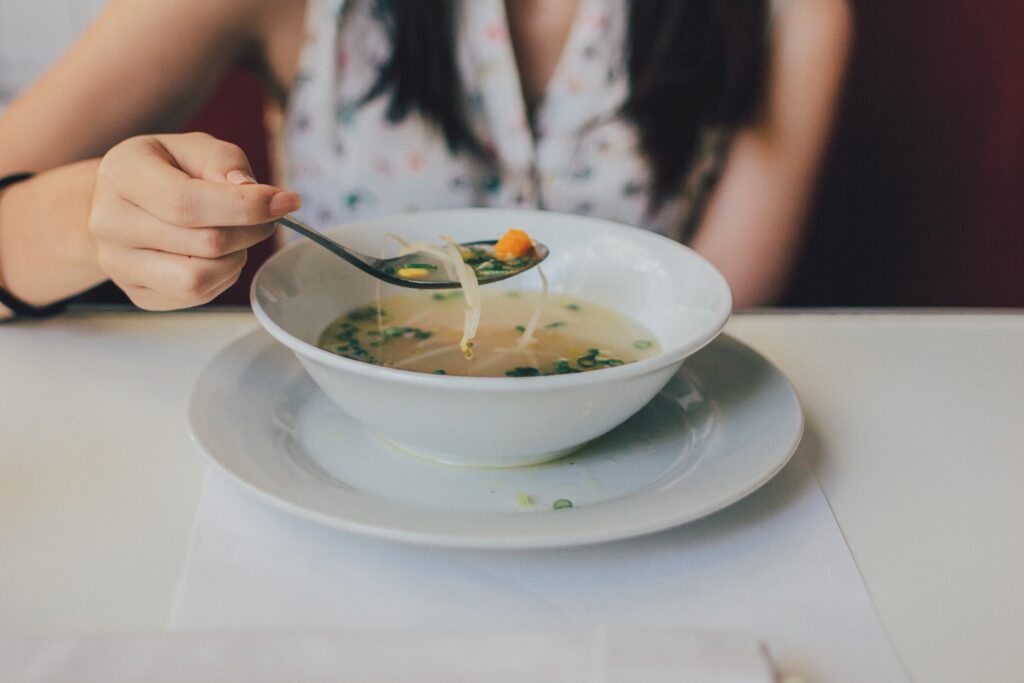
As it turns out, the age-old remedy of feeding chicken soup to someone with a cold isn’t unfounded.
An article in Live Strong reports a study featured in the Chest Medical Journal. It states that chicken soup’s chemical properties do have the ability to relieve cold symptoms.
Researchers explain that chicken soup works by keeping the mucus secretions thin.
At the same time, it slows down the activities of the white blood cells that trigger the body’s inflammatory response.
Try chicken soup if you have phlegm:
Heat chicken soup in a pot. Eat the soup throughout the day based on your condition.
Read More: 7 Surprising Health Benefits of Split Pea Soup
13. Gargle
Gargling is quite an old traditional remedy for cold suggested by our grandparents. [29]
Gargling is an excellent remedy for a cough and phlegm. If the mucus gets stuck on the back of your throat, it can cause discomfort and irritation. [30]
The water needs to be warm, and it’s better to add some salt to make it more effective.
This remedy will clear the phlegm, diminish the germs and even ease your sore throat.
Simple gargle method to get rid of phlegm:
Add ½ tsp of salt to a glass of warm water. Wait for the salt to dissolve. Then, take a mouthful of water and rinse for thirty to a minute. Spit out and repeat the same with the whole glass of water.
Read More: 18 Essential Oils for Sore Throat and How to Use Them
14. Licorice Root
A favorite herb of herbalists is to get rid of mucus. Licorice root tea helps loosen the mucus, making it easy to expel the mucus from the body so that oxygen can flow smoothly. [31]
Its anti-inflammatory properties and soothing effect can calm your lungs. Drinking licorice root tea can help cure asthma, cough, congestion, and phlegm.
Licorice root is an excellent expectorant, meaning it can prompt phlegm’s exile from the lungs.
The herb is sweeter than the regular sugar, so you don’t need to add extra sugar to make the tea.
Learn how you can take licorice root tea for phlegm:
Add 1 tsp of dried licorice root into two cups of water and boil it for five minutes. Let the herb steep for another 5-10 minutes based on how strong you want the tea to be. Then, strain the tea and drink it. You can drink this tasty and beneficial tea two times a day until you get well.
Read More: 11 Moringa Tea Benefits You Should Know About
15. Apple Cider Vinegar
You will hardly get a home remedy that doesn’t include apple cider vinegar, no matter the disease.
And why not? You can heal with you if you have a skin problem, overweight issue, upset stomach, sore throat, leg cramps, infections, cough, or phlegm. [32]
Apple cider vinegar or ACV contains vitamins B1, B2, and B6, pectin, biotin, niacin, folic acid, and vitamin C. It also comes with a small number of minerals such as iron, potassium, magnesium, phosphorus, and sodium. [33]
It’s one of the most effective remedies for phlegm as it can break up the mucus in your body and soothes chronic allergy and sinusitis symptoms.
ACV is a good source of potassium, which can help you get rid of a runny nose.
How to use ACV when you have phlegm:
Mix one tablespoon of ACV in a glass of water. You should drink the water three times a day. Then, continue the process until you heal. You can also add raw, unfiltered apple cider vinegar to a bowl of boiling water and inhale the steam.
Read More: How Effective is Apple Cider Vinegar for Ringworm Treatment?
When to See a Doctor
Phlegm is a common thing and not a reason for worry. But if it becomes a regular occurrence, you might feel uncomfortable. You should consult a doctor if your phlegm doesn’t go within one month or more.
You may develop phlegm due to other issues such as allergies, acid reflux, asthma, and chronic bronchitis. In this situation, you might need medical attention.
Let your doctor know if you have other issues with phlegm, such as blood in your cough, chest pain, wheezing, or shortness of breath.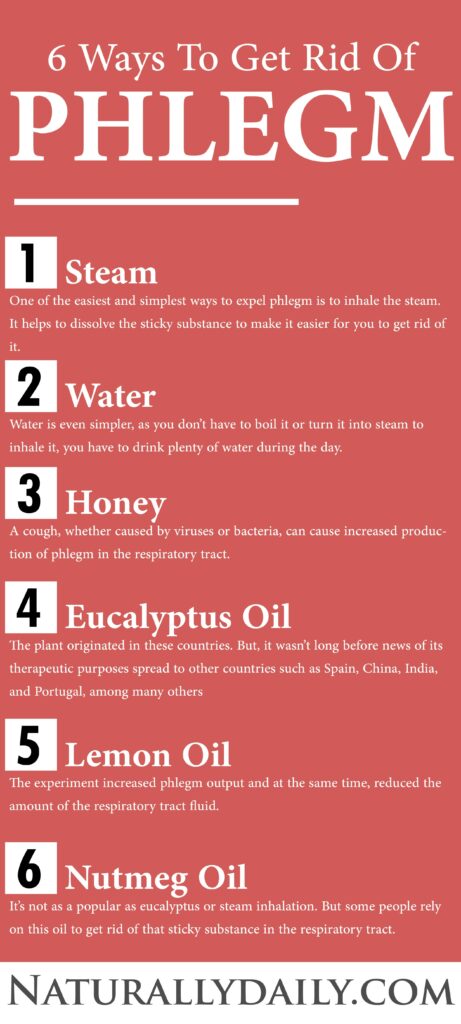
Bottom Line
Phlegm isn’t usually a medical concern.
Phlegm contains enzymes and antibodies that help your body identify and kill attackers like viruses and bacteria.
But, an excess of it can hamper normal day-to-day functioning, and you may feel miserable. You can try the above home remedies to get rid of phlegm naturally. Many clinical and anecdotal data suggest the efficacy of these natural remedies.
Read Next: 12 Effective Ways to Get Rid of Common Cold That’ll Work.


